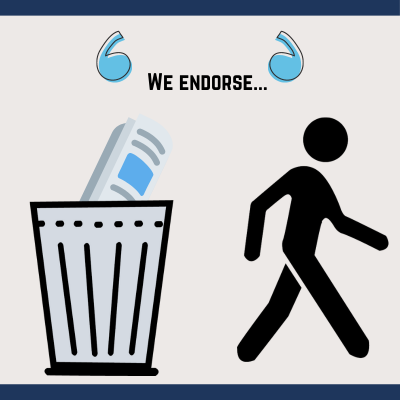The New England Journal of Medicine published an editorial on Oct. 8 passionately denouncing the current administration’s handling of the coronavirus in the U.S. This opinion, while a common consensus among the majority of Americans, comes as a shock after the publication’s 208-year silence on politics.
The surprise surrounding this editorial showcases the extreme polarization within American politics — even science has become political.
Politics is, of course, intertwined with every aspect of life, but for journalists, that relationship is all the more complicated.
Our job is, above all else, to report the objective truth. We sacrifice the option of amplifying our opinions to earn and keep the trust of the people we serve. However, there is still a moral obligation to spread informed opinions to our readers.

NEJM did just that. The editorial board never explicitly endorsed a candidate, but urged their readers to vote President Donald Trump out of office. Its members believe that the president is attempting to deny science — the very backbone of their publication.
The editorial is unprecedented, but so is this presidency. Save for times of war, the United States has never seen such chaotic polarization, and as a result, no one can truly be neutral. Not even journalists are immune.
It is not sustainable or honest to pretend that you are unbiased and trying to hide your personal values can even undermine the legitimacy of your work. Instead, being transparent about underlying opinions allows readers to make their own judgements on whether they want to trust a certain publication.
If a journalist chooses not to vote, for example, that does not make them unbiased. It just makes them quiet. The same goes with a newspaper as a whole. That is why there is an opinion section in the first place. It serves as a forum for journalists, separate from the newsroom, to share their informed opinions.
But the distinction between hard news and editorial should be more clear.
In an ideal world, everyone will be media literate. Everyone would know the difference between sensationalized news and reliable news as well as between opinion and hard news. But we don’t live in an ideal world. We live in one that is riddled with tabloids and confusion.
So, people see an editorial such as NEJM’s or a political endorsement from The New York Times and don’t recognize that it’s opinion, which makes readership that much more divided.
Some people will trust the newspaper’s opinion more than others because it is a well-researched and succinct argument. Especially when publishing political endorsements, a newspaper is able to break down jargon and complicated political platforms into a digestible article that can help inform its readers’ decisions.
The argument is often localized, at least for regional papers, and based on interviews with individual candidates. But, how far does the merit of these political endorsements go when the tradeoff may be the general public’s trust?
Part of the reason this country has become so successfully polarized is our unwillingness to listen to what the other side’s voices have to say. When a newspaper endorses a candidate you don’t agree with, you are more likely to turn away from its stories because you now have a glimpse of its editorial board’s opinion — which you may assume to be its journalists’ opinion.
And due to today’s unrelenting party loyalty, an endorsement is really more likely to change the reader’s opinion of the publication than their view on the candidate being endorsed. If the true goal is to just inform the public of a candidate’s standpoint, it may be more productive to interview knowledgeable sources and cover their platforms in depth.
Even an opinion as informed as NEJM’s can be spun as fake news and quickly discredited, which will only further deter the people it is trying to convince from reading it. But, the journal’s own opinions will most certainly make people think and maybe that’s the whole reasoning behind it.
So perhaps, the purpose behind its editorial reaches beyond trying to sway political opinions. It’s about speaking up when something is too important to be quiet about.
The current administration is threatening the progression of science and public health. Trump’s detrimental behavior has forced science itself into a polarized political conversation it hasn’t quite held a place in before.
This election now threatens research from the world’s top experts whose credibility continues to be called into question by one of the most powerful men in the world. It’s no surprise, really, that in this case NEJM felt a need to speak out on the danger of the Trump administration.
It will come at a cost nonetheless — the editors have opened a door that exposes their political leaning and leaves them victim to the potential damnation from readers who disagree. But informing the public of truth does not apply only to hard news. It applies to every sector of a journalistic publication.











































































































